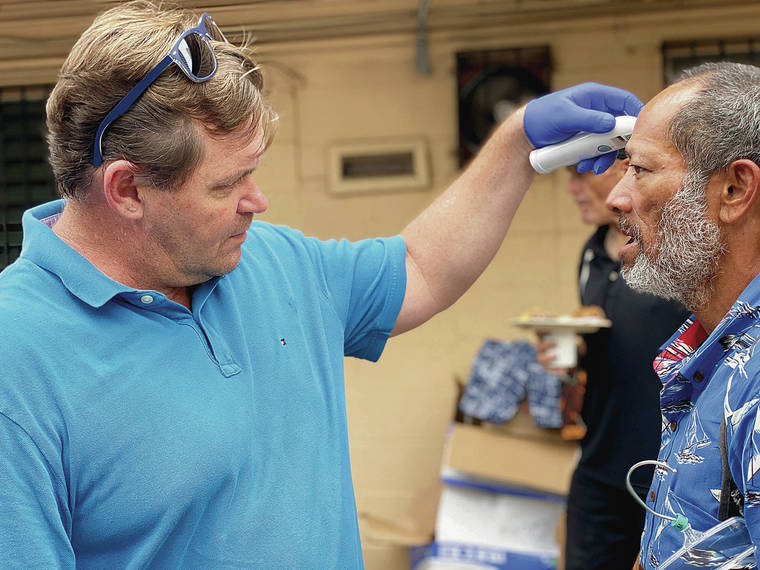IHS begins coronavirus screening of homeless in Waikiki

INSTITUTE OF HUMAN SERVICES
Workers from the Institute of Human Services began screening homeless people this week for the new coronavirus.
The Institute for Human Services began taking the temperatures of homeless clients in Waikiki this week and plans to share information about the novel coronavirus Opens in a new tab in homeless encampments across Oahu.
IHS, which operates Hawaii’s largest emergency homeless shelters, also has begun screening clients before they’re allowed into either the separate men’s and women’s shelters in Iwilei.
“There are no cases in the shelter,” said Justin Phillips, IHS’ outreach field manager.
During IHS’ regular Thursday night outreach at St. Augustine’s Church in Waikiki, workers for the first time began asking new questions — such as whether they have a fever, cough, respiratory issues and whether they’ve traveled recently — of the nearly 100 homeless people who showed up in an effort to determine their risk of contracting the coronavirus.
No one required additional screening Thursday. If IHS workers do encounter a homeless person who requires further assessment, Phillips said they will put a mask on the person and call for an ambulance to avoid public transportation.
“What prompted this is a need to begin the process of informing and educating the homeless population about what’s going on,” Phillips said.
Don't miss out on what's happening!
Stay in touch with breaking news, as it happens, conveniently in your email inbox. It's FREE!
While people around the world scramble for accurate information about preventing the spread of coronavirus, Phillips said it’s even especially difficult for homeless people.
“It’s even harder for them to get real information, so we want to be proactive,” Phillips said. “We’re trying to educate people about washing their hands and trying to limit their contacts. If they see someone coughing, they might want to let them know that maybe they should get screened.”
At St. Augustine’s Church, homeless people were served dinner, could pick out donated clothes, got haircuts — and 31 took advantage of a private, hot shower in the Revive + Refresh hygiene trailer. Two homeless people also agreed to move off the street and into shelters, Phillips said.
“The word’s gotten out,” said IHS spokeswoman Jacque Vaughn. “There were so many people lining up before they even opened.”
IHS outreach workers plan to begin asking coronavirus-related questions in homeless encampments across the island “where groups congregate together,” Phillips said.



